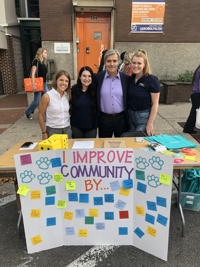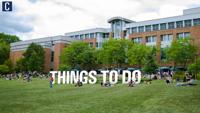How Penn State HealthWorks, peer educators provide aid to students throughout pandemic | University Park Campus News
Staying healthy has become more important than ever before at Penn State — both mentally and physically. While they’re not a stranger to campus, the university’s HealthWorks is striving to keep students at their best.
From stress and sleep to nutrition, HealthWorks provides students with a variety of health aid.
Penn State’s HealthWorks is a group of peer educators who are co-led by Katelyn Quick, a clinical dietician for Penn State Health Promotion and Wellness, and Erin Raupers, assistant director for Penn State Health Promotion and Wellness.
Split into two categories with peer educators, Quick focuses on outreach while Raupers takes on one-on-one student appointments. The overall goal for the program is to empower students to engage in healthy behavior and to advocate for a healthy Penn State community.
“I really feel strongly that health and wellness has to do with a holistic, whole-body approach,” Quick said.
Now held via Zoom because of the coronavirus, the one-on-one appointments focus on a range of student health topics such as nutrition, physical activity, sleep, stress, or healthy relationships and sexual health.
The coronavirus also caused Quick and her team to hold virtual office hours. Typically, HealthWorks makes informational material for students, conducts workshops for classes and clubs as well as tabling at in-person events.

“I think public health is really important because, instead of affecting just the individual in private nutrition appointments whenever I’m leading this public health program, I know that I can affect different levels of change,” Quick said. “I can help change the environment that students are in or change social norms with different campaigns that we do, and so I find that to be really exciting.”
Quick said they’re able to reach more people with a “larger public health approach.”
The peer educators who are part of HealthWorks go through a spring interview process followed by a semester-long training program. The three-credit class for Penn State students is taught by either Quick or Raupers, depending on which side of HealthWorks the student is interested in. These classes cover both public health and theory before narrowing into the specific HealthWorks field each student will be in.
Dalia Rivkin, a student who began as a peer educator this semester, said she came into the class knowing she wanted to help others but wasn’t sure how.
“After the training course, I know that I have the ability to either give students the information they need or at least know which direction to point them in,” Rivkin (junior-nutritional sciences) said via email.
Rivkin joined HealthWorks after getting a taste of helping others through Penn State’s Health & Wellness Coalition her sophomore year.
“We met a few times over the course of the year to discuss the health and wellness of Penn State students and see what we could do to help [them] in categories ranging from sexual heath to eating more vegetables to getting more sleep and everything in between,” Rivkin said. “I [loved] the coalition, but it made me want a more direct impact on Penn State students and their wellbeing.”
Lucy Stone also began this semester as a peer educator. Stone (junior-biobehavioral health) trained to work with students in one-on-one sessions through HealthWorks.

“[The training is] a lot based on learning about the health topics that we mentor students about, but it’s also equally as much learning — it’s called motivational interviewing,” Stone said. “It’s one of the methods that we use when talking to students and helping them understand their goals.”
In addition to learning these skills in class, peer educators also practiced scenarios with other students to experience what some of the one-on-one sessions they encounter might look like.
“I think a lot of people more than ever are struggling with some of these issues that we help people with — such as stress and getting enough physical activity, and having proper nutrition,” Stone said. “So I think with the pandemic and everything, it’s really helpful to have that outreach and work with students who need help with those things.”
On the outreach side of HealthWorks is Paige McGhee. McGhee (sophomore-health policy and administration) began as a peer educator this spring as well, where she said they provide the “education and skills” for any wellness concerns students have.
McGhee said HealthWorks has not only enabled her to help others but also herself.
“HealthWorks taught me a lot about my own body — like lifestyle and habits — and I made great changes, but I also get to help my classmates and friends do the same,” McGhee said.
MORE CAMPUS COVERAGE

As students adjust to in-person classes and campus life again after THON weekend, here are s…
Amanda Malizia-Hicks saw an ad about HealthWorks and the enthusiasm of other peer educators made her want to join. Malizia-Hicks (senior-labor and human resources) said she likes to help her peers live healthier lifestyles.
“Healthworks has adjusted this past year due to COVID-19 and offers some great programming via Zoom,” Malizia-Hicks said via email. “I feel like this is important because this past year hasbeen hard on students.”
According to Quick, applications to become peer educators for fall 2021 classes are now open until March 5.
“I’m glad it’s a really strong program because not all universities get to have so many peer educators impacting students on campus.”
